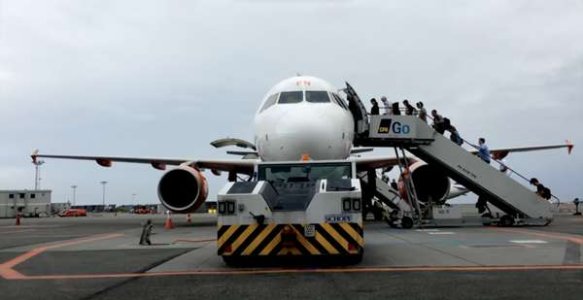The sneaky flight trick an airline is banning—travelers, take note!
- Replies 0
As travel demand surges and airfare prices climb, many travelers are constantly searching for ways to cut costs.
Some have turned to unconventional booking strategies to find cheaper flights, but not all savings tricks go unnoticed.
A major airline is now cracking down on a popular loophole that passengers have used to bypass high fares, and those who attempt it could face unexpected consequences.
Skiplagging is a strategy used by some thrifty travelers to take advantage of a loophole in airline pricing.
It involves booking a flight with a layover and intentionally not boarding the second leg of the journey, exiting at the layover city instead.
This can sometimes result in a cheaper ticket than booking a direct flight to the layover destination itself.
For example, a $129 flight from New York's JFK to Washington D.C.'s Dulles with a layover in Charlotte is cheaper than a direct flight to Charlotte, which costs $151.
By skipping the final leg to Dulles, passengers reach Charlotte for less while avoiding the higher direct fare.
Some savvy travelers have relied on this method to save money on airfare, and consumer advocates have even built websites to help passengers find these loopholes.
Also read: No means no: This passenger refused to give up their airplane seat to this child–Find out why!
However, skiplagging comes with risks. Airlines, including American Airlines, strongly oppose this practice, arguing that it disrupts their operations and causes revenue losses.
As a result, they have ramped up enforcement efforts, closely monitoring passenger itineraries for suspicious bookings.
Passengers caught using skiplagging may face serious consequences, including being placed on a “do not fly” (DNF) list, losing frequent flyer miles, or having their tickets canceled.
A social media user recently shared an experience where their check-in was flagged because their home address was near the layover city.
After questioning, the airline warned them that failing to board the second leg of their flight would result in a ban.
This isn't an isolated incident. In July 2023, a teenager was stopped by American Airlines officials after booking a skiplagged ticket from Boston to Charlotte.
The airline canceled his original flight and required his family to pay $300 for a direct ticket.
Also read: Think twice before wearing shorts on a plane—flight attendants explain why
American Airlines has also taken legal action against platforms promoting skiplagging.
In October, a Texas jury awarded the airline $9.4 million in damages after suing Skiplagged, a website dedicated to finding hidden city fares.
The airline cited copyright infringement and revenue loss as key factors in the case.
In response to growing concerns, American Airlines issued a statement reiterating that skiplagging violates its ticketing policies.
Also read: Solo traveler’s refusal to give up her seat sparks outrage–Would you have moved?
The airline warned that skipping segments of a booked itinerary could create operational issues with checked baggage and prevent other travelers from securing seats on fully booked flights.
A spokesperson stated, “Intentionally creating an empty seat that could have been used by another customer or team member is an all-around bad outcome.”
While skiplagging remains a tempting option for budget-conscious travelers, airlines are making it increasingly difficult to use this loophole without consequences.

What are your top tips for finding the best airfare deals? Share your experiences and advice in the comments below. Let's help each other travel smart and save money, all while staying within the rules of the sky.
Read next: Discover the hidden safety secrets of airplanes: 6 mysterious features that could save your life
Some have turned to unconventional booking strategies to find cheaper flights, but not all savings tricks go unnoticed.
A major airline is now cracking down on a popular loophole that passengers have used to bypass high fares, and those who attempt it could face unexpected consequences.
Skiplagging is a strategy used by some thrifty travelers to take advantage of a loophole in airline pricing.
It involves booking a flight with a layover and intentionally not boarding the second leg of the journey, exiting at the layover city instead.
This can sometimes result in a cheaper ticket than booking a direct flight to the layover destination itself.
For example, a $129 flight from New York's JFK to Washington D.C.'s Dulles with a layover in Charlotte is cheaper than a direct flight to Charlotte, which costs $151.
By skipping the final leg to Dulles, passengers reach Charlotte for less while avoiding the higher direct fare.
Some savvy travelers have relied on this method to save money on airfare, and consumer advocates have even built websites to help passengers find these loopholes.
Also read: No means no: This passenger refused to give up their airplane seat to this child–Find out why!
However, skiplagging comes with risks. Airlines, including American Airlines, strongly oppose this practice, arguing that it disrupts their operations and causes revenue losses.
As a result, they have ramped up enforcement efforts, closely monitoring passenger itineraries for suspicious bookings.
Passengers caught using skiplagging may face serious consequences, including being placed on a “do not fly” (DNF) list, losing frequent flyer miles, or having their tickets canceled.
A social media user recently shared an experience where their check-in was flagged because their home address was near the layover city.
After questioning, the airline warned them that failing to board the second leg of their flight would result in a ban.
This isn't an isolated incident. In July 2023, a teenager was stopped by American Airlines officials after booking a skiplagged ticket from Boston to Charlotte.
The airline canceled his original flight and required his family to pay $300 for a direct ticket.
Also read: Think twice before wearing shorts on a plane—flight attendants explain why
American Airlines has also taken legal action against platforms promoting skiplagging.
In October, a Texas jury awarded the airline $9.4 million in damages after suing Skiplagged, a website dedicated to finding hidden city fares.
The airline cited copyright infringement and revenue loss as key factors in the case.
In response to growing concerns, American Airlines issued a statement reiterating that skiplagging violates its ticketing policies.
Also read: Solo traveler’s refusal to give up her seat sparks outrage–Would you have moved?
The airline warned that skipping segments of a booked itinerary could create operational issues with checked baggage and prevent other travelers from securing seats on fully booked flights.
A spokesperson stated, “Intentionally creating an empty seat that could have been used by another customer or team member is an all-around bad outcome.”
While skiplagging remains a tempting option for budget-conscious travelers, airlines are making it increasingly difficult to use this loophole without consequences.
Key Takeaways
- American Airlines is cracking down on the practice of skiplagging, where passengers save money by booking flights with layovers and skipping the final leg.
- Customers have been advised on techniques to avoid detection when utilizing this loophole, such as not using frequent flyer miles and carrying all belongings in a backpack.
- The airline has increased its enforcement of ticketing policies, with reports of passengers being flagged and potentially placed on a do not fly list if they don't complete their booked itinerary.
- American Airlines won a legal battle against the Skiplagged website, with a Texas jury awarding $9.4 million in damages due to copyright infringement and loss of revenue.
Read next: Discover the hidden safety secrets of airplanes: 6 mysterious features that could save your life
Last edited:







